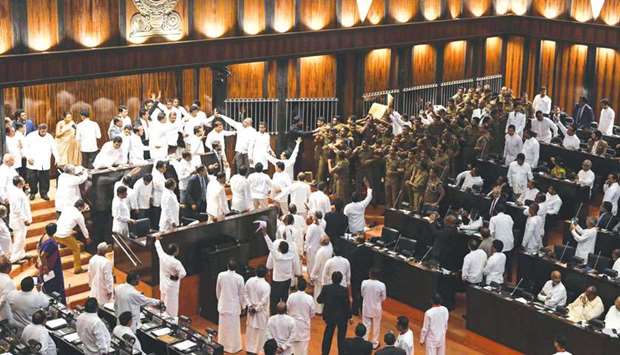The Indian Ocean nation has been paralysed since October 26 when President Maithripala Sirisena sacked Ranil Wickremesinghe as premier and replaced him with former strongman Mahinda Rajapakse.
With a second no-trust vote against Rajapakse yesterday despite raucous scenes that involved his supporters throwing chilli powder at their opponents, Wickremesinghe demanded the restoration of status quo prior to October 26.
“Let the status quo come back,” Wickremesinghe told Colombo-based foreign correspondents at his Temple Trees residence where he remained holed up after refusing to accept his sacking three weeks ago. “The country needs stability. That is the main issue.”
He said he was also ready to work with Sirisena despite their bitter personality clash that triggered the unprecedented constitutional crisis last month. There was no immediate
comment from Sirisena.
Yesterday Speaker Karu Jayasuriya was blocked from taking his chair for almost an hour by a group of legislators backing Rajapakse.
Finally, Jayasuriya entered the red-carpeted chamber protected by dozens of unarmed officers and parliamentary staff.
Rioting MPs took away the ornate ceremonial chair, but staff carried in an ordinary office chair as a makeshift
replacement.
However, rioters grabbed that chair too, breaking it into pieces that were then used as projectiles to attack rivals and police.
A former parliament staffer said yesterday’s scenes were never seen before.
“We haven’t had a situation where the speaker was prevented from entering the chamber,” former sergeant-at-arms Wijaya Palliyaguruge said. “This is also the first time that the speaker had to come in with
police protection.”
British High Commissioner (ambassador) James Dauris echoed international concern over violence in Sri Lanka’s parliament, a legacy from British colonial rule that ended in 1948.
“Sri Lankans have again seen deplorable behaviour by some MPs, unbecoming of them and of their noble institution,” Dauris said on Twitter. “No parliament can perform its role when its own members stop it
from doing so.”
Standing in a corner with a human shield of khaki-clad constables, the speaker, in his usual black and gold robes, used a wireless microphone to take a voice vote on a revised no-confidence motion against
Rajapakse.
Rajapakse lost a similar vote on Wednesday, but refused to step down saying that vote was not taken properly. His party had acknowledged that they did not command a majority in the 225-member assembly despite attempts to engineer defections.
President Sirisena, who has the power to appoint a new prime minister, told political parties representing a majority of legislators on Thursday night to submit an amended motion to confirm the toppling of
Rajapakse.
On Thursday MPs moved another resolution against Rajapakse, this time to reject his call for snap elections. That vote could not go ahead after parliament descended into chaos, as punches and projectiles flew.
Rajapakse himself stayed away from the rioting and walked out of the chamber after the no-trust motion was passed against him.
A Rajapakse loyalist was seen throwing chilli powder at rival legislators and police. At least 11 constables and several legislators were taken to the parliament’s medical centre for first aid.
Gamini Jayawickrema Perera, a legislator from Wickremesinghe’s party, said he was among those treated after chilli mixed with water was thrown at his face.
Leftist lawmaker Vijitha Herath said he suffered a forehead injury when a rival hit him with a hard-cover copy of the constitution that was on the
speaker’s table.
“I was also attacked with chilli water,” Herath said. “Usually, chilli powder or water is the favourite weapon of bank
robbers and gangsters.”
Another legislator Anura Kumara Dissanayake said he saw a Rajapakse supporter assaulting a parliament employee guarding the speaker’s chamber.

